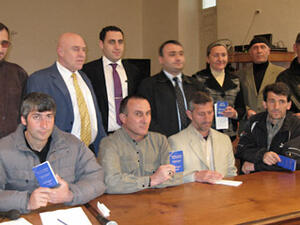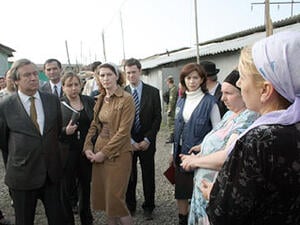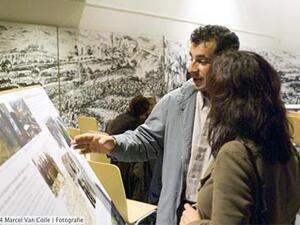A third of refugees in Poland may be homeless
A third of refugees in Poland may be homeless

Zeynab fled to Poland from Chechnya in 2004. She and her son have been homeless for four years. A third of Poland's refugees could be homeless and many more are at risk
WARSAW, 20 February (UNHCR) - A third of refugees granted asylum in Poland may be homeless forced to sleep in shelters, empty buildings, train stations or even night buses.
Zeynab* and her twenty-something son Akhmad are two of those facing the problems identified in Refugee Homelessness in Poland, a pilot study conducted by the Institute of Public Affairs and funded by UNHCR.
Homeless for most of the last three years, they spend many nights in buses, a local mosque, cheap hotels or other people's houses. Recently they have been staying in the flat of a friend who is out of town but do not know where they will go when their host returns. They arrived in Poland in 2004 after their closest family members had been killed during the war in Chechnya, leaving them with very few relatives. They were granted asylum (subsidiary protection) two years later.
"We have only each other," Zeynab sobbed when a social worker suggested the pair separate to increase their chances of finding a home. The widowed mother could never accept such an outcome. There are hundreds of refugees in Poland in a situation similar to that of Zeynab and Akhmad; one third of refugees in the country may be homeless according to the study.
The case of Zeynab and her son illustrated one of the key findings of the study. They lived in a refugee centre while their asylum applications were processed and during the year-long integration programme that followed.The problem came when the programme with its housing and living benefits ended and they were expected to support themselves. They have been homeless ever since.
"The greatest risk of homelessness appears when the integration programme ends," said Kinga Wysieńska, co-author of the study which concluded that the integration programme does not fulfill its function. "In the space of one-year, refugees are not able to learn Polish or acquire professional and socio-cultural competencies necessary to undertake work and function independently in the society," said Wysieńska. Zeynab and Akhmad survive thanks to him finding random and very low paid jobs. The money is enough to buy food, but not to rent a flat. "Look!" Zeynab pointed to their feet. "The last salary let us get winter shoes!" she said, smiling briefly.
She is normally extremely fatigued, appears often lost in thought and her speech can be impeded. She most probably suffers from severe Post-Traumatic Stress Disorder from her experiences in the Chechnya war but receives no professional help in Poland."Zeynab is extremely vulnerable," said Izabela Majewska, a social worker at Polish Humanitarian Action who has been in touch with her since her arrival to Poland. But the Refugee Homelessness study found that single mothers with small children face the highest risk of homelessness.
Dagman came to Poland from Chechnya with her husband and three kids in the same year that Zeynab arrived, fled the abusive relationship and faced years of homelessness until only recently receiving a council flat."Everyone knew about it, when we stayed in a refugee centre," she said of the abuse and beatings by her husband that had begun years before. "But no one took any action." It was only when he had beaten their teenage daughter unconscious that Dagman finally made the decision to escape, an extremely risky move as she knew he would pursue them. "He kept calling, asking where we were and threatening that he would burn me alive. I don't know how I survived it, but I did," Dagman said.
She wept as she talked of her children being beaten, but remained composed as she talked of her own suffering. She had spent years moving with her children from one crisis intervention centre to another each time she reached the six-month limit for stays.
Her miracle happened when they were granted a council flat, one of only five allotted yearly by the Warsaw City Council to refugee families. They now enjoy 50-square-meters of safety. "I still can't believe it. I keep thinking that something horrible will happen to us soon. It has been too good for too long," Dagman said. All her children attend school and Dagman works part-time as a cleaner to supplement what she receives in alimony from the government. They can pay the rent and survive, but not much more. And she still lives in fear of the day when her ex-husband, jailed for not paying alimony,will be released from prison.
While there are no official statistics on refugee homelessness in Poland, the pilot study concluded all refugees are at risk of housing exclusion --lacking either enough income to pay rent and deposits or facing discrimination from landlords. Many experience it.
The study found that refugee homelessness is a long-term problem, often lasting many years. Dagman and her children are among the very few lucky ones. Zeynab and Akhmad are still waiting for their own roof.
By Magda Qandil in Warsaw
* All names are changed for protection reasons.








